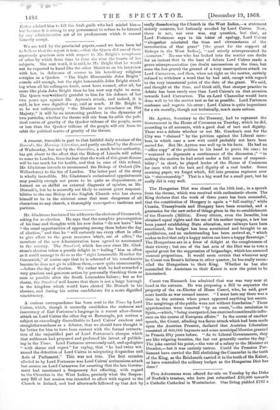A curious correspondence has been sent to the Times by
Lord Cairns, which, though it assuredly establishes the rashness and inaccuracy of Earl Fortescue's language in a recent after-dinner attack on Lord Cairns the other day at Barnstaple, yet revives a subject so exceedingly discreditable to Lord Cairns' candour and straightforwardness as a debater, that we should have thought it far better for him to have been content with the formal retracts- tion of the unjustified part of Lord Fortescue's charges which that nobleman had prepared and professed his intent of publish- ing in the Times. Lord Fortescue erroneously said, and apologizes "with shame and regret" for saying, that "he had twice wit- nessed the detection of Lord Cairns in misquoting despatches and Acts of Parliament." This was not true. The first occasion alluded to by Lord Fortescue was Lord Cairns' acrimonious attack last session on Lord Carnarvon for asserting that the late Govern- ment had sanctioned a Suspensory Act effecting, with regard to the Churches in the West Indies, precisely what the Suspen- sory Bill of last session was intended to effect with regard to the Church in Ireland, and had afterwards followed up that Act by
really disendowing the Church in the West Indies,—a statement strictly accurate, but furiously assailed by Lord Cairns. Now, there is not, nor ever was, any question, but that, as Lord Fortescue says in his letter of apology, Lord Cairns "altogether misstated the time and circumstance of the introduction of that grant" [the grant for the support of Bishops in the West Indies], "and utterly misrepresented its character." No one who has looked into the matter can doubt for an instant that in the heat of debate Lord Cairns made a grave misrepresentation (no doubt unconscious at the time, but none the less grave) the ground of a very unscrupulous attack on Lord Carnarvon, and then, when set right on the matter, entirely refused to withdraw a word that he had said, except with regard to the very immaterial point of the date of the grant. We said, and thought at the time, and think still, that sharper practice in debate has been rarely seen than Lord Cairns's on that occasion towards Lord Carnarvon. The ex-Lord Chancellor would have done well to let the matter rest as far as possible. Lord Fortescue confesses and regrets his error ; Lord Cairns is quite impenitent for a sin morally, though not technically, much more serious.






































 Previous page
Previous page